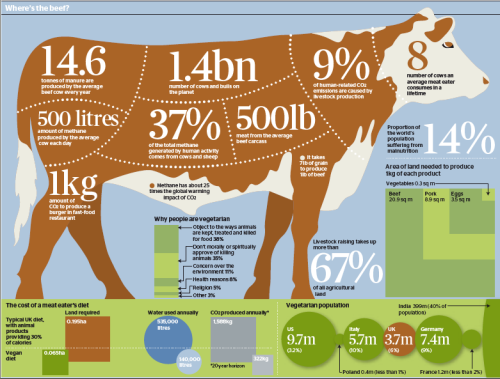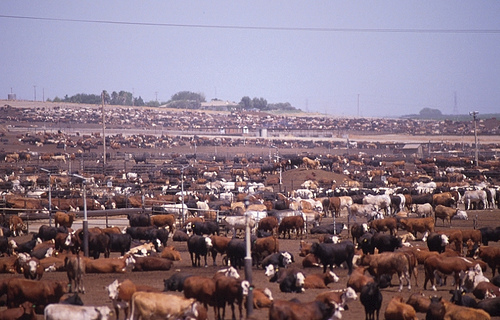Before I kick off this post, however, there's a website you should check out for some entertainment : www.themeatrix.com (once again, something I stole from Sabrina- thanks!!).
 |
| http://extras.timesonline.co.uk/pdfs/tthwheresthebeef.pdf |
Since I began this "project", many people have commented to me on the question of the environmental effects of a vegetarian diet. Yes, growing crops and grains on a large scale requires land, thus usually, the clearing of forests, etc. But what most people don't realize is that at least 70% of the grain grown in America is used for livestock feed, not humans. Around the globe, more than two thirds of all agriculture land is used for growing feed for livestock, while only 8% is used for direct human consumption according to the Livestock, Environment, and Development Initiative (LEAD). Rainforests in South America are being destroyed and cleared more and more every day to plant soy bean crops, the major component of feed used for pigs. When you consider how many people are starving to death all over the world daily, it seems absurd that so much grain is used to feed our insatiable desire for meat. The demand for meat is only rising every day, with the development of third world countries.


Growing of these crops for livestock feed takes a whole lot of water, too. In John Robbins book, The Food Revolution, he states that to produce one pound of beef, it takes 2,500 gallons of water. On the other hand, it takes 33 gallons of water to produce a pound of carrots. Here's the crazy part: for every 16 ounce steak a person consumes- it's the equivalent of 6 months worth of water used for showers!

Now think about the amount of fuel it takes to transport all the materials needed daily around the world for all the factors associated with livestock production. It seems there is no escaping large amounts of fuel use when you consider fuel to produce the feed (machines for watering, plowing, etc), transporting the feed, electricity to run the livestock factories, transporting the livestock to slaughterhouses, transporting the meat all over the world to supermarkets, etc.
Now, I know Thanksgiving is in 3 days, and I'm not saying don't indulge and eat all you can- just try and balance out what you know you will be indulging in. Perhaps eat meat free until Thanksgiving. Or do without meat for a few days afterwards. Every little bit helps!
So Happy Thanksgiving, people! I'll let you know how my first pescetarian Thanksgiving goes later....
No comments:
Post a Comment